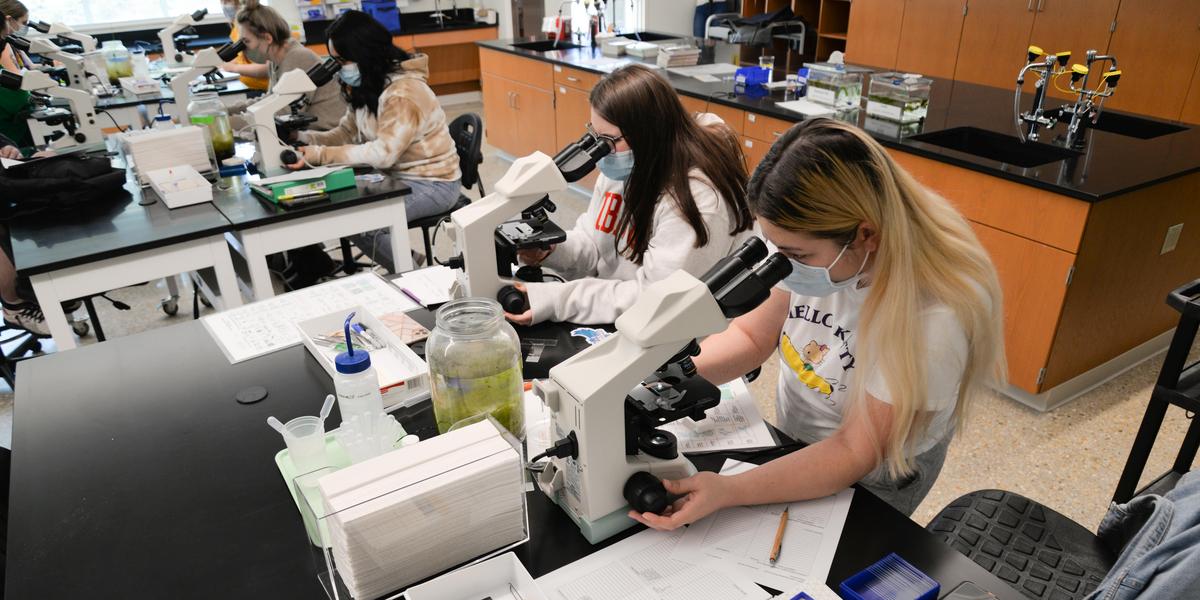
Science is the study of the natural world based on facts learned though experimentation and observation. As a discipline it requires curiosity, creativity, imagination and focus. It uses the tools from many other disciplines to develop, present and share ideas about the world and borrows clues from many other disciplines to identify areas for investigation. While science as a whole is divided into two interrelated sub-disciplines – physical science which focuses on physical phenomena and life science which focuses on life and living systems – collectively the areas of science improve our understanding of the world and how it works.
If living things, even life itself, fascinates you, biology may be the field for you. From plants (botany) to animals (zoology), human anatomy to nutrition this is where our understanding of the living world comes together. Plus, our area provides many environmental challenges that allow faculty and students to apply their knowledge in the field (and marshes and creeks!). Learn more about how you can join those efforts in the Environmental Center.
Students interested in life sciences may earn an Arts and Sciences Transfer (A.S.) degree in one of several options. Our department also offers credit certificates in the environmental sciences. Learn more about our areas of study:
Debra Bartlett, Ph.D., professor
410-777-1851
[email protected]
Jameson Coopman, assistant professor
410-777-2270
[email protected]
Mickey Dehn, associate professor
410-777-2706
[email protected]
Tammy Domanski, Ph.D., professor
410-777-2274
[email protected]
Mark Farinha, Ph.D., professor
410-777-1287
[email protected]
Sandra Fox-Moon, Ph.D., assistant professor
410-777-2265
[email protected]
Lauren Gillespie, Ph.D., assistant professor
410-777-2251
[email protected]
Mary Holden-Musser, Ph.D., assistant professor
410-777-2841
[email protected]
Karen Israel, Ph.D., professor
410-777-2278
[email protected]
Susan Lamont, Ph.D., professor
410-777-1219
[email protected]
Harry Li, assistant professor
410-777-2178
[email protected]
Kelly Livernoche, assistant professor
410-777-2348
[email protected]
Carrie Long, associate professor
410-777-1258
[email protected]
Seth Miller, Ph.D., assistant professor
410-777-2335
[email protected]
Gregory Schrader, Ph.D., professor
410-777-1216
[email protected]
Julie Takacs, Ph.D., associate professor
410-777-2123
[email protected]
Benjamin Weibell, Ph.D., professor
410-777-2845
[email protected]
Krista White, Ph.D., associate professor
410-777-1290
[email protected]
Kendel Hannon, biology laboratory manager
Biology
410-777-1977
[email protected]
Philippe "Phil" Espitallier, technical specialist
GBTC
410-777-2997
[email protected]
Steve Lannon, technical specialist
AMIL
410-777-2022
[email protected]
Ashley Danus, technical specialist
Biology
410-777-1268
[email protected]
Joseph Quagraine, technical specialist
Biology
410-777-2466
[email protected]
Tara Williamson, technical specialist
Biology
410-777-1254
[email protected]
Kelli McBride
410-777-2281
[email protected]
Rachel Ryckman, administrative coordinator
410-777-2643
[email protected]
Anthony Anderson, program assistant
410-777-2105
[email protected]
James Seeders, program assistant
410-777-2108
[email protected]
If you're taking a science course, the following resources are for you. They were developed to help you complete your science course requirements successfully.
Located in Dragun Room 120, (410-777-6370), the Science Computer Lab has about 20 computers equipped with software to support a variety of science courses. Internet access is also available. This lab can be reserved for class use by your instructor.
The Biology and Environmental Club is a place for those passionate about the life sciences to grow, learn and experience biology together. We do various events related to the sciences such as field trips, guest speakers and on-campus projects.
Led by Director Tammy Domanski, the Environmental Center at AACC supports the college's mission through applied research projects designed and led by faculty to address local environmental necessities. You have the opportunity to participate in these projects through collaborative work that assists in the development of solutions to a variety of contemporary environmental problems.
Maryland has been described as America in miniature because of its great diversity of natural resources. The types of environmental challenges confronting Maryland's people, government, industries and civic organizations are very similar to those confronting several areas of the country.
Field trips are paused for right now, but we hope to get back to our normal pattern as described below soon.
Several of our courses regularly have field trips as part of the curriculum. For example, each fall and spring term, oceanography, meteorology, Earth-space science and environmental science students are given the opportunity to participate in hands-on activities during three-hour educational cruises on a skipjack or a schooner sailing vessel. These cruises are coordinated through the Living Classrooms Foundation and are usually conducted in Baltimore's Inner Harbor. Once on board the sailing vessels, students participate in several activities including raising and lowering the sails, trawling for fish, taking water quality measurements, deploying a plankton net and investigating oyster anatomy. In addition, students are exposed to interesting stories and landmarks surrounding Baltimore’s Inner Harbor including historical Fort McHenry.